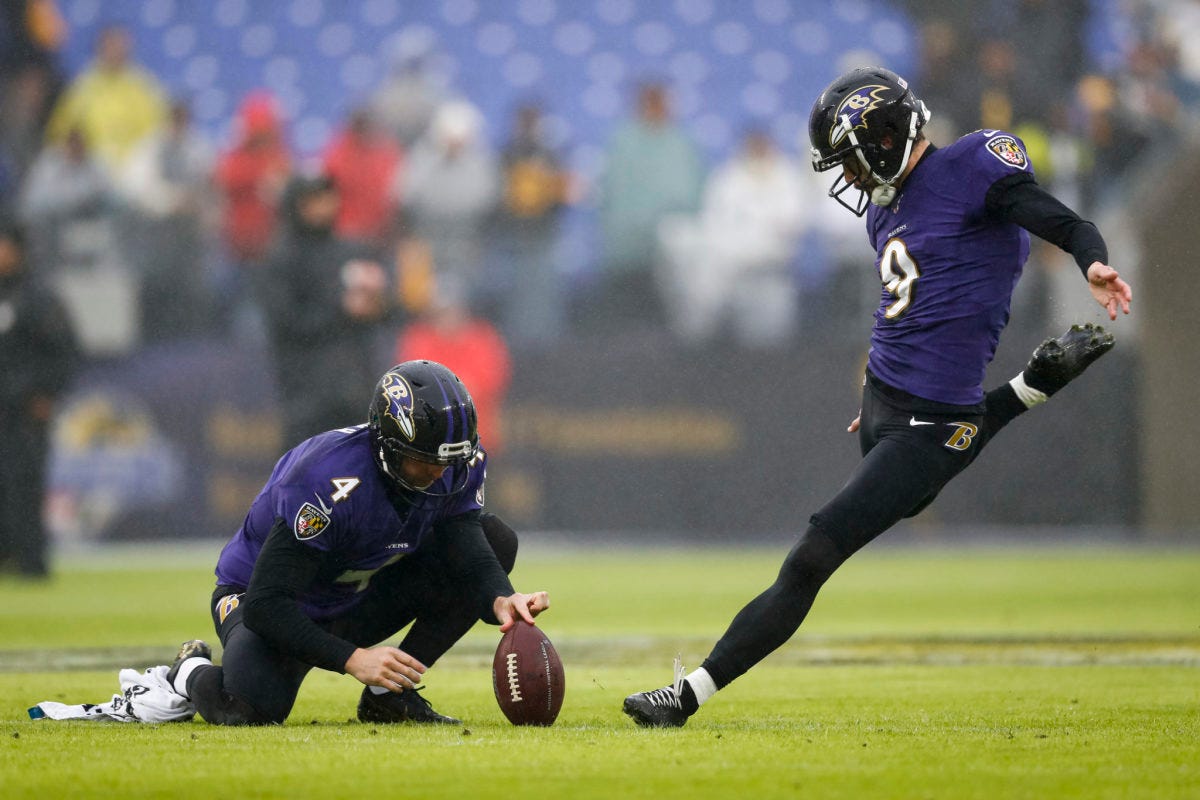Sport Psych in Action With Justin Tucker
Lessons from the GOAT 📝
Last Sunday, Baltimore Ravens kicker Justin Tucker sealed a last second win against the Bengals with his impressive 58 yard game winner. But a kicking clinic isn’t the only thing he put on that night. His post game interview was an absolute masterclass in how to apply sport psychology principles to help achieve performance excellence.
Here are 5 sport psych insights that we can learn from the GOAT. (Full interview linked here.)
Trust
The first question in the interview is, “Having made 61 straight in the 4th quarter, does it get any easier for you?” Tucker responds: “In a way, because we have been able to be successful in these moments for the last decade…and it’s crazy even saying that or thinking about it like that.” It’s clear that Tucker has been there before and that he has a deep sense of trust in himself, and in his teammates (notice he says “we”). This trust is earned. It’s a genuine form of confidence that has been fortified through action. Rather than focus on keeping his streak alive and winning the game, Tucker chooses to focus on his strengths and trust in his ability to get the job done.
Concentration
His next statement is, “What matters in those 1.3 seconds between the snap the hold and the kick are the things that are going to help the kick go through the uprights.” Kickers have a tough job, often being asked to perform under enormous amounts of pressure which can spur feelings of nervousness, distraction, and doubt. Despite these challenges, Tucker chooses to concentrate his attention on what’s helpful. For him, that’s the sequence of events that contributes to a solid kick. He notes “My emotions, my feelings, for 1.3 seconds, they don’t really matter.” And he’s right. Feelings come and go. Whether they are “good” feelings or “bad” feelings is irrelevant. What matters is being able to execute when it counts. Tucker chooses to focus on the things that help him to do so.
The Importance of Knowing Your Values
“I say a brief prayer as I’m lining up the kick, not to ask for results but to ask for peace. And to show gratitude just for being able to be in that moment and bring joy to millions of fans who love watching Ravens win football games.” Your values are your why, creating a personal connection to your goals. Tucker recognizes that results matter. I guarantee he wants to win every time he steps out on the field. Yet, he’s also connected to something that’s bigger than winning. It is these personal connections that serve as deep rooted motivators and ultimately drive our sense of commitment, no matter the outcome.
Performance Happens in the Present
Kickers and coaches will sometimes communicate with each other before games to discuss how the kicker is feeling and what distance they feel comfortable with that day. Tucker makes it clear that he is not, and never has been, a part of that process. “I’m not involved in the conversation. All I know is that when I’m being sent out there it’s to make the kick and put points on the board.” Tucker doesn’t put constraints on his game by worrying about the future. Stepping outside the present and getting caught up in thoughts of the past or future takes our attention away from what matters right now. It’s his ability to be fully immersed in the present moment that allows him to zone in, concentrate on what’s important, and execute.
Routines vs. Superstitions
Superstitions are behaviors that are believed to impact performance, but have no real technical function or impact. Tucker knocking on wood at the start of the interview is an example of a superstition (but yes, probably just a joke in this context). Routines, on the other hand, are specific actions that are personally implemented and designed to enhance performance. They have technical, mental, and/or physiological components to them that prepare the mind and body to perform. While superstitions are contingent on external factors, you control the routine you develop and integrate. Routines should simple and flexible so that they can be used in a variety of environments and adapted if needed. Tucker makes it clear: “I want to make sure that I go through my routine as efficiently as possible. So if it’s a 58 yarder or a 38 yarder, I just want to make sure I’m available and go through my routine as best I can.” I’d say his routine is working.
GOAT status isn’t achieved by happenstance. It’s evident that Justin Tucker has put in the work to enhance both his physical and mental game and lock himself in as one of the most clutch kickers of all time. For a team to put it’s faith in him, time and time again, and continually execute with the game on the line is a seriously tall task. Being clutch means taking action to execute, and making it happen. Tucker shows us how psychological skills training can help us do exactly that.


This is an outstanding article!